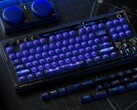Historically, there's probably no more well-known home computer than the Commodore 64. Now, a new edition of the Commodore 64 is available for pre-order, specifically the Commodore 64 Ultimate. The current price is $299.99, with delivery scheduled for October to November 2025.
According to the manufacturer, compatibility is guaranteed with at least 99% of all cartridges, games and accessories released in the 1980s and 1990s. Unsurprisingly, the system doesn't use the original processor, but rather an AMD Xilinx Artix-7 FPGA, along with 128 MB of DDR2 RAM and 16 MB of flash storage. Video output is possible via HDMI or via DIN-8 connectors, with the latter allowing users to relive nostalgic memories on a traditional tube TV. USB storage media are supported, as is emulation of the cassette drive, which can also be connected in the same way as a data cassette or floppy disk drive.
Audio output is available via a 3.5mm jack as well as optically via S/PDI, and Ethernet and Wi-Fi are integrated. A keyboard with the original layout is installed, featuring mechanical Gateron Pro 3.0 switches and integrated RGB lighting. The scope of delivery includes a USB stick with licensed video games, music tracks, and demos, including an exclusive sequel to Jupiter Lander: Ascension.





















